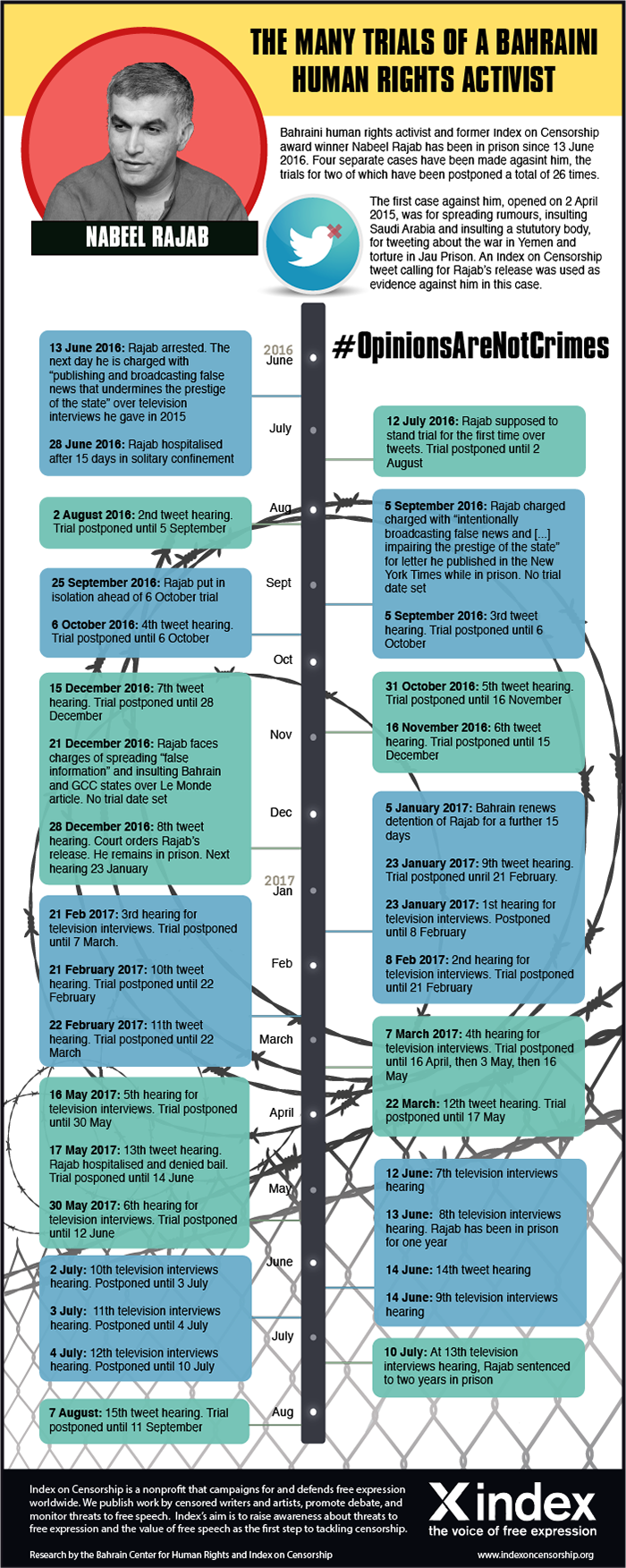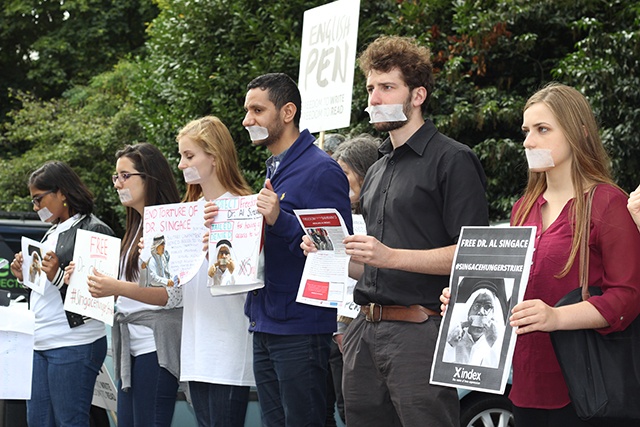Index relies entirely on the support of donors and readers to do its work.
Help us keep amplifying censored voices today.

Bahraini human rights defender Nabeel Rajab (Photo: The Bahrain Institute for Rights and Democracy)
Prince Charles is to make an official visit to Bahrain in November despite the escalating human rights crackdown in the country. This endorsement comes after Queen Elizabeth sat next to the king of Bahrain at her 90th birthday celebrations this summer.
Last week, the UN Human Rights Council commissioner Zeid Ra’ad Al Hussein expressed grave concerns about the country: “The past decade has demonstrated repeatedly and with punishing clarity exactly how disastrous the outcomes can be when a government attempts to smash the voices of its people, instead of serving them.”
Today, Sayed Ahmed Alwadaei, director of advocacy at the Bahrain Institute for Rights and Democracy, told The Times: “The timing of Prince Charles’s visit suggests that the major human rights violations in 2016 are not in the British monarchy’s mind.”
Here are just a few things Index on Censorship would encourage the prince to keep in mind ahead of his trip:
1. The treatment of Nabeel Rajab
Human rights campaigner Nabeel Rajab, who has been arrested multiple times because of his peaceful activism, has been detained since 13 June for comments he made on Twitter. Charges brought against him for his tweets, and even retweets, include spreading “false or malicious news, statements, or rumours”, “offending a foreign country” and “offending a statutory body”.
Rajab was also recently charged with “defaming the state” after a critical op-ed he wrote appeared in The New York Times.
Just last week, the UK government was urged by a group of 50 NGOs to put pressure on Bahrain over Rajab’s treatment. With news of the state-sanctioned Prince Charles visit, it appears these calls have of fallen on deaf ears.
Rajab is expected to be sentenced at his next court hearing on 6 October. He faces more than 15 years in prison.
2. The detention of critics
The Bahraini government has repeatedly used prison as a weapon to silence its critics. Opposition activist Zainab Al-Khawaja was sentenced to three years in prison in December 2014 for “insulting the king” after she ripped up a picture of him. Though she has now been released, her father Abdulhadi Al-Khawaja, a human rights activist and a member of the Bahrain 13, remains in prison along with over 3,500 other prisoners of conscience.
On 22 June 2011 a military court sentenced all members of the Bahrain 13 to between five years and life in prison, on trumped-up charges of attempting to overthrow the regime, “broadcasting false news and rumours” and “inciting demonstrations”. All but two of them remain behind bars.
Last year, the Liberties and Human Rights Department of Al-Wefaq National Islamic Society recorded a total of 1,765 arrests by security services for reasons related to the opposition political movement, including the detention of 120 children and five women.
3. Rendering critics stateless
Another abusive tactic used by the government of Bahrain is to revoke the citizenship of many of its critics. This is illegal under several international agreements, including the Universal Declaration of Human Rights and the International Covenant on Civil and Political Rights. Regardless, 208 Bahrainis were rendered stateless in 2015 alone.
Since amending its citizenship law in 2014, Bahrain’s judges can strip citizenship from anyone convicted under anti-terrorist laws. However, the law does not properly define “terrorism” and several of those subjected to this fate in 2015 were convicted under vague terms such as “inciting and advocating regime change” to “defaming brotherly countries”.
Most of those rendered stateless have been deported, along with their families.
4. Censoring the internet
Named by Reporters Without Borders as an “enemy of the internet“, Bahrain has been busy clamping down on the web over the last few years. Despite being one of the best-connected countries in the world from a technical perspective, Freedom House gives the country an online freedom rating of 72, with 100 being the worst possible score.
News, human rights and opposition websites are routinely blocked, with estimates putting the total number at over 1,000. Social media users have been arrested and had posts forcibly removed, including those of the satirical account @Takrooz whose only post is now: “They tortured me in prison.”
The government is also working on a new Russian-inspired default search engine that would allow it to filter results without the cooperation of Western-based companies such as Netsweeper, which was exposed by the Associated Press as a facilitator of Bahrain’s censorship program.
[vc_row][vc_column][vc_video link=”https://youtu.be/GBQX0TvFMbs”][vc_column_text]This article was updated on 31 August 2017
Have you expressed disapproval of your government? Called for more democratic decision-making in your country? Criticised prison conditions or criticised a country allied with your government? Retweeted a comment that included #opinionsarenotcrimes?
You are a criminal. You could be facing up to 15 years in prison for simply expressing your point of view if you lived in Bahrain.
Nabeel Rajab, just like you, thinks his country could be better. And he has made those views public. He speaks out against poor prison conditions and argues for more freedom of speech in Bahrain.
Friday 1 September 2017, marks his second birthday in prison, where he has been since 13 June 2016. He has been subjected to harsh treatment in often appalling conditions that have exacerbated his health issues.
Rajab — due in court on 11 September in one of the cases against him — is facing trial for tweets and retweets about the war in Yemen in 2015, for which he is charged with “disseminating false rumours in time of war” (Article 133 of the Bahraini Criminal Code) and “insulting a neighboring country” (Article 215 of the Bahraini Criminal Code), and for tweeting about torture in Jau prison, which resulted in a charge of “insulting a statutory body” (Article 216 of the Bahraini Criminal Code).
What’s worse, it’s just the latest in a long line of actions taken by the Bahraini government against Rajab, one of the Middle East’s most prominent human rights defenders.
Rajab has been subjected to ongoing judicial harassment, physical intimidation and imprisonment for his non-violent advocacy of democracy and for his calls for an end to endemic corruption. Police officers have beat him up, the country’s press have published the government’s accusations against without his side of the story. He has been imprisoned, pardoned, banned from travelling, rearrested and held in solitary confinement.
Despite the huge personal cost to himself and his family, Rajab continues to speak out.
His activism began during protests in the 1990s and grew with his involvement with the Bahrain Human Rights Society, which he helped found in 2000.
In 2002 he partnered with Abdulhadi al-Khawaja, who is now serving a life sentence for his human rights work, and others to launch the Bahrain Center for Human Rights, which was awarded an Index on Censorship Freedom of Expression Award in 2012. BCHR has consistently spoken out for non-violent resistance and the peaceful struggle for social justice, democracy and human rights.

Nabeel Rajab, BCHR – winner of Bindmans Award for Advocacy at the Index Freedom of Expression Awards 2012 with then-Chair of the Index on Censorship board of trustees Jonathan Dimbleby
Rajab has also been outspoken in working for the protection of the Gulf’s migrant workers, founding, in 2003, one of the first committees in the region to advocate improved conditions for them.
When the Arab Spring swept across the Middle East in 2011, Rajab participated in the pro-democracy protests that were focused on the Pearl Roundabout in the country’s capital Manana. His vocal criticism of human rights violations and outspokenness — even after the government issued a state of emergency and invited foreign intervention to help maintain control — brought him into frequent conflict with security forces.
Born 1 September 1964 to a middle-class family, he went to university in India to study politics, before returning to work in Bahrain. Rajab is married and has two children. He is a nephew of Mohamed Hasan Jawad, one of the “Bahrain 13” — political figures imprisoned for participating in the Arab Spring protests, and a cousin of Hussain Jawad, a prominent human rights activist arrested in February 2015.
What can you do to help?
Silenced temporarily by the Bahraini government, Rajab needs you to use your voice. Speak out in support of free speech and human rights.
Index calls on #Bahrain to end judicial harassment of @NabeelRajab and drop all charges #opinionsarenotcrimes
— Index on Censorship (@IndexCensorship) March 14, 2015
 [/vc_column_text][/vc_column][/vc_row][vc_row][vc_column][vc_basic_grid post_type=”post” max_items=”12″ style=”load-more” items_per_page=”4″ element_width=”6″ grid_id=”vc_gid:1504263730538-3d233804-f31e-8″ taxonomies=”3368″][/vc_column][/vc_row]
[/vc_column_text][/vc_column][/vc_row][vc_row][vc_column][vc_basic_grid post_type=”post” max_items=”12″ style=”load-more” items_per_page=”4″ element_width=”6″ grid_id=”vc_gid:1504263730538-3d233804-f31e-8″ taxonomies=”3368″][/vc_column][/vc_row]

Protesters in London demand the release of Abduljalil al-Singace, July 2015.
One year has passed since Index on Censorship magazine editor Rachael Jolley sent a copy of the publication – Fired, Threatened, Imprisoned… Is Academic Freedom Being Eroded? – to jailed Bahraini academic, human rights activist and writer Abduljalil al-Singace to mark his 150 days on hunger strike.
Al-Singace’s hunger strike ended on 27 January 2016 after 313 days, but he remains in prison.
In a letter accompanying the magazine, Jolley aired concerns that al-Singace – who had been protesting prison conditions while being held in solitary confinement – had suffered torture and called on the Bahraini authorities to ensure he “had access to the medical treatment he urgently requires”.

Index magazine editor Rachael Jolley pens letter to Bahrain’s Ministry of Interior regarding al-Singace, 17 August 2015.
On 15 March 2011 Bahrain’s king brought in a three-month state of emergency, which included the through establishing of military courts known as National Safety Courts. The aim of the decree was to quell a series of demonstrations that began following a deadly night raid on 17 February 2011 against protesters at the Pearl Roundabout in Manama, when four people were killed and around 300 injured.
Over 300 individuals were subsequently convicted through National Safety Courts, often for speaking out against the government or exercising their right to assemble freely. Many were punished simply for supporting or being part of the country’s opposition movement.
On a midnight raid at his home on 17 March 2011, al-Singace was arrested at gunpoint. During the arrest, he was beaten, verbally abused and his family threatened with rape. Disabled since his youth, al-Singace was forced to stand without his crutches for long periods of time during his arrest. Masked men also kicked him until he collapsed. The Bahraini authorities placed him in solitary confinement for two months. During this time the guards starved him, beat him and sexually abused him.
Al-Singace is part of what is known as the Bahrain 13, a group of peaceful activists and human rights defenders imprisoned in Bahrain in connection with their role in the February 2011 protests.
On 22 June 2011 a military court sentenced all members of the Bahrain 13 to between five years and life in prison, on trumped-up charges of attempting to overthrow the regime, “broadcasting false news and rumours” and “inciting demonstrations”.
Evidence used against them was extracted under torture, but this didn’t prevent their sentences being upheld on appeal in September 2011, at a civilian court in May 2012 and in January 2013 at the Court of Cassation. The Bahrain 13 has now exhausted all domestic remedies and are currently serving their sentences Jau prison, notorious for torture and ill treatment.
During their arrest and detention, the Bahrain 13 were subject to beatings, torture, sexual abuse and threats of violence and rape towards themselves and members of their family by police and prison authorities. Eleven of the 13 remain in prison.
The group consists of:
Al-Singace
Sheikh Abduljalil al-Muqdad, a religious cleric and a co-founder of the al-Wafaa Political Society. During his detention he has been beaten, tortured and told his wife would be raped.
Abdulhadi al-Khawaja, a human rights activist and co-founder of the Bahrain Center for Human Rights. On 8 February 2012, he began a hunger strike to protest his wrongful detention and treatment in prison. He ended his hunger strike after 110 days on 30 May 2012. He went on hunger strike again in April 2015 to protest against the torture of prisoners at Jau.
Salah al-Khawaja, a prominent human rights activist, marriage consultant and the brother of Abdulhadi. The government previously arrested Salah in the 1980’s and 1990’s for engaging in political activity against the government. He was released on 19 March 2016.
Abdulhadi al-Makhdour, a religious cleric and political activist. Authorities prevented him from showering and performing his daily prayers. They spat in his mouth and forced him to swallow. They also denied him access to a lawyer and barred him from contacting his family.
Mohammed Habib al-Muqdad, a religious cleric and the president of the al-Zahraa Society for Orphans. During his time in prison he was sexually assaulted with sticks and forced to gargle his own urine. Security guards also electrocuted him on his body and genitals.
Mohammed Ali Ismael, a prominent political activist in Bahrain. During his imprisonment, he has been beaten and verbally abused.
Abdulwahab Hussain, a life-long political activist and leader of the Al Wafaa political opposition society. He was previously detained for six months in 1995 and for five years between 1996 and 2001. He was diagnosed with multiple peripheral polyradiculoneuropathy, a condition which affects the body’s nerves, in 2005 and suffers from sickle-cell disease and chronic anaemia. His health conditions have worsened as a direct result of the torture and ill-treatment, while medicine and treatment have been denied to him. During his current sentence he has contracted numerous infections.
Mohammed Hassan Jawad, human rights activist who campaigns for the rights of detainees and prisoners who has been jailed a number of times since the 1980s. During his current imprisonment, he was electrocuted and beaten with a hose.
Sheikh Mirza al-Mahroos, a religious cleric, a social worker, and the vice-president of the al-Zahraa Society for Orphans. During his time in prison, Al-Mahroos has been denied medical treatment for severe pain in his legs and stomach. Despite having the proper documentation, he was not permitted to visit his sick wife, who later died in early 2014.
Hassan Mushaima, a political activist and leader of the Al Haq opposition society in Bahrain who has been arrested several times for his pro-democratic activities. He was diagnosed with lung cancer in 2010, which he was successfully treating at the time of his arrest. Medical results have been denied to him in prison.
Sheikh Saeed al-Noori, a religious cleric and member of the al-Wafaa Political Society. During his detention he has been tortured, forced to stand for long periods of time and had shoes stuffed in his mouth.
Ebrahim Sharif, the former president of the National Democratic Action Society. He is a political activist and has campaigned for democratic reform and equal rights. On 19 June 2015, Sharif was released following a royal pardon, only to be rearrested on 12 July 2015. He was charged with “inciting hatred against the regime” for a speech he delivered in commemoration of 16-year-old Hussam al-Haddad, who was shot and killed by police forces in 2012. He was released again in July 2016 and remains out of prison but the Bahrain Institute for Rights and Democracy he is at risk of being arrested again because of an appeal by prosecutors.
Source: The Bahrain Institute for Rights and Democracy.
Also read:
– Bahrain continues to use arbitrary detention as a weapon to silence critics
– Bahrain: critics and dissidents still face twin threat of statelessness and deportation

Bahraini human rights defender Nabeel Rajab (Photo: The Bahrain Institute for Rights and Democracy)
Nabeel Rajab, the Bahraini human rights activist and Index on Censorship award winner, was due to stand trial on 2 August – now postponed until 5 September – over comments he made on Twitter criticising government institutions. In Bahrain, such comments can land you in jail, as Rajab has seen before, having spent two years behind bars for tweets made in 2012.
Index looks at how Rajab has been treated by the Bahraini authorities over the years.
Rajab became involved in the uprisings in Bahrain of the 1990s to demand democratic reforms within the country.
Rajab co-founded the Bahrain Human Rights Society to strengthen calls for democratic reforms.
Rajab worked with Abdulhadi al-Khawaja and others to found the Bahrain Centre for Human Rights, an NGO to promote human rights in Bahrain.
Rajab suffered a spinal injury, fractured arm, broken finger and head injury after being attacked by Bahraini’s Special Security Force Command while attending a peaceful rally by the Committee for the Unemployed to protest against the government’s management of unemployment levels.
During a government crackdown on dissent in the summer of 2010, Rajab’s photograph was published a number of times in the pro-government publication Al-Watan, accusing him of supporting terrorists and publishing false information. Other publications followed suit.
On 8 September, a warrant for his arrest was issued and he was subject to a travel ban. Just over a week later, these were dropped.
During the 2011 Arab Spring, Bahrain’s monarchy faced serious threats. As a result, even peaceful demonstrators were met with brutal government repression, leaving over 30 dead. Rajab had been a leading voice during the Bahraini uprising, and many associated with him faced a backlash. Even members of CNN’s news team were arrested by the government’s security forces as they visited his house in April. “Twenty men in black ski masks are reported to have surrounded the news team and confiscated their recording equipment,” Index reported at the time.
In June, Rajab was summoned to a military court just hours before Bahrain was due to lift its emergency law, which saw the arrival of Saudi troops in Bahrain to help crush the peaceful protests. Rajab then went missing for several of days.
On 6 January 2012, Rajab was hospitalised being beaten by security forces after leading a protest in Manama and briefly detained. On 12 February he was briefly detained after he tried to march to the location of the Pearl Roundabout in Manama, where government forces cracked down on protesters during the 2011 uprising.

Nabeel Rajab, BCHR – winner of Bindmans Award for Advocacy at the Index Freedom of Expression Awards 2012
In March, the Bahrain Centre for Human Rights won Index on Censorship’s Freedom of Expression Award for advocacy, which recognises campaigners who fight repression.
In April, Bahrain hosted the annual Formula One Grand Prix. Following the negative media coverage around the event, Bahraini authorities stepped up their suppression of the country’s protest movement. During this time, Rajab was arrested and released several times.
On 5 May, Rajab was arrested at Bahrain International Airport on his arrival from Lebanon the day before the scheduled court hearing relating to a protest he had attended in March. The following day, he was charged with “insulting a statutory body of Twitter”. He was released on 28 May but re-arrested on 7 June, and in July was sentenced to three months in prison for allegedly defamatory tweets.
On 16 August he was sentenced to three years in prison for charges related to “illegal gathering”. Between 2012 and 2014, Rajab spent two years behind bars.
In October 2014, a court ruled that Rajab would face criminal charges stemming from a single tweet in which both the ministry of interior and the ministry of defence allege that he “denigrated government institutions”. Rajab faced up to six years in prison.
He was due to stand trial on 19 October. It was adjourned until 29 November and he was denied bail. In November it was adjourned again until 20 January 2015 and Rajab was freed without bail.
When Rajab finally stood trial on 20 January, he was sentenced to six months in prison, which was suspended pending a fine. He was granted bail while he appealed the verdict. It wasn’t long before he was summoned by police again, and fresh fears emerged of his arrest. On 26 February, he wrote an email to supporters which read: “Just to inform you that I was summoned today morning to attend the police station at the same time – and I came to know that the new charge against me will incitement of hatred against the regime.” In early April he was arrested, again for comments made online.
While his appeal date was set for 15 March, it was repeatedly postponed.
On 14 July, the Bahraini king pardoned Rajab three months into a six-month sentence for the tweet. According to Bahrain’s official news agency, this was over fears for his health.
Back in January, Rajab was given an arbitrary travel ban. Index, along with other NGOs, called for this ban to be lifted so that he could travel abroad with his family to secure medical assistance for his wife, Sumaya Rajab.
On 13 June, he was taken from his home early in the morning and his electronic devices were seized. The next day, he was charged with “spreading false news” and has been in detention since, awaiting trial. After 15 days in solitary confinement, Rajab was hospitalised in late June.
On 7 July, the European Parliament adopted a resolution condemning recent human rights abuses in Bahrain and called for an end to the ongoing repression against the country’s human rights defenders, political opposition and civil society.
A few days later, a coalition of international NGOs, including Index on Censorship, condemned Bahrain’s treatment of Rajab.
His trial was due to take place on 2 August but has been postponed until 5 September. A tweet by Index, which Rajab shared, is to be used as evidence against him. It reads:
Index calls on #Bahrain to end judicial harassment of @NabeelRajab and drop all charges #opinionsarenotcrimes
— Index on Censorship (@IndexCensorship) March 14, 2015